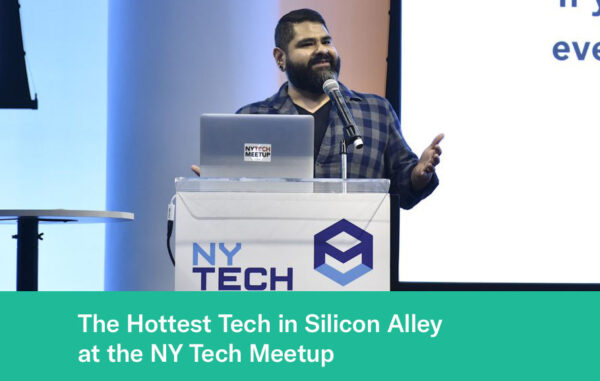Each month, we bring you the highlights the Silicon Alley’s longest-running tech event, the NY Tech Meetup. Indicative was proud to be among the presenting companies at July’s event, hosted at AppNexus. Presenters demoed technology that ranged from helping consumers save money, to helping the city plant longer-lasting trees. Read more about the night’s highlights below.
NYC Open Data Contest Winners
The evening began with the winners of the NYC Open Data Contest — an initiative by the city’s division that maintains open data sets on information about the municipality. The contest was created to make the open data sets more accessible to the general public, but showing how they could be applied to make useful tools, NYC Director of Civic Engagement and Strategy Adrienne Schmoeker said.
Two of the projects used data from the 2005 and 2015 tree census to visualize the information for practical purposes. Data Scientist Niki Athanasiadou created Plan(t)wise to give recommendations on types of trees to plant in various areas of the city to increase their life expectancy. Athanasiadou was motivated to pursue the project by estimates that city trees live one-fifth of the lifetime that they do in other habitats. Allen Yee also used the tree census data to create a dynamic visualization of the trees in the city over time, by type and borough. He said the map, which you can find on Cloudred, is useful for ensuring diversity in the tree species grown in NYC.
Bitsy Bentley was the third winner to present her project, the Participatory Budgeting Project. At mypb.community, New Yorkers can see how public dollars are being spent in neighborhoods across the city, and find the information for representatives supporting the issues they care about.
Indicative
Our very own CEO Jeremy Levy shared the power of behavioral analytics with the NY Tech community. Levy simulated the customer journey by guiding the audience through a quiz about steps they’ve taken in their lives in pursuit of becoming a business founder. Levy used Indicative’s funnel tool to analyze the different paths audience members took to reach the conversion point — in this case, becoming a business founder. The funnel tool is commonly used by marketers, product managers, and data analysts to get a sense of all the different paths customers take to get to a certain conversion point. The NY Tech Meetup audience was able to see how their paths to entrepreneurship varied and converged at different points in time.
Swoup
In a world where there is a “Tinder” for everything, there is now a “Tinder for coupons.” Swoup lets users swipe on coupons like they would potential matches on a dating app, and rack up savings to use with their partners, the first of which is Walgreens. Swoupers don’t even need to have the app open at checkout — the coupons in their virtual wallet are automatically applied through their rewards card. Within the app, the money saved can be allocated to charity, banks accounts, or even college savings. Founder Philip Parrotta said it took him decades to pay off his student loans, and he now uses Swoup to contribute to his niece and nephew’s college savings.
Dash
Dash wants to tell you when your car needs to be fixed before it’s broken down on the side of the road. It collects data from the car with a small device and then notifies drivers on their app about potential problems it identifies using machine learning. Dash, which the company said has been downloaded in over 100 countries, has developed a predictive model of battery life with manufacturer Johnson Control. Dash claimed their model is 85-90 percent accurate, compared to the 60 percent accuracy of previous algorithms.
GrowNYC
GrowNYC, an organization that runs farmers’ markets throughout the city, may seem like an unusual participant at the NY Tech Meetup. But the group has entered the tech scene by creating an app to help consumers understand what’s available at the markets and where to find them every day. The volunteer endeavor is now used by chefs, wholesalers, and regular city dwellers to discover fresh, local produce and goods to more efficiently navigate the markets.
